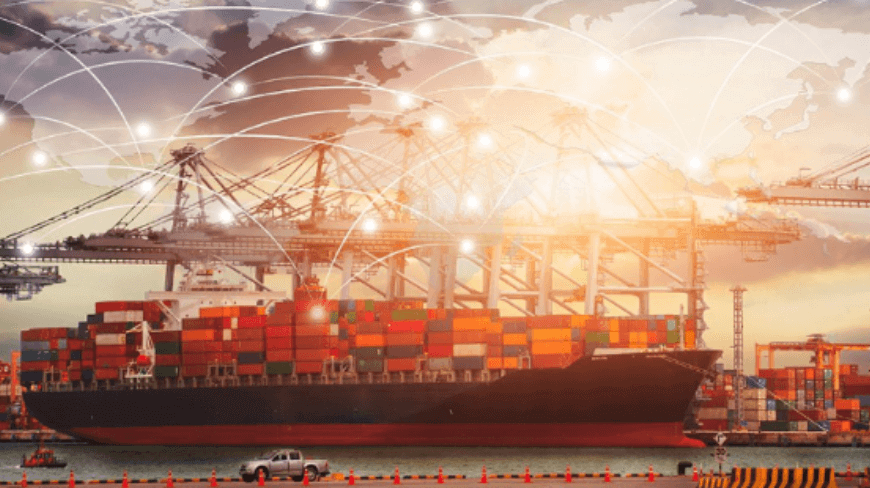In today's world, businesses face a lot of challenges, especially when it comes to getting the right products to the right places at the right time. This is known as the supply chain, and sometimes it can get really messy. From shortages of materials to delays in shipping, there are many things that can go wrong. But don't worry! With the right enterprise resource planning ERP solution, you can survive the supply chain crunch and keep your business running smoothly.
Understanding supply chain issues is crucial for comprehending the entire supply chain:
First, let's talk about what the supply chain crunch actually means. Basically, it's when there are problems in the process of getting products from where they're made to where they're sold. These disruptions can happen due to a lot of reasons such as demand fluctuations, logistic challenges, supply disruptions or communication breakdown. Sometimes, there's not enough of a certain material to make the products. Other times, there might be a problem with shipping, like a big storm that delays the delivery trucks. Whatever the reason, it can cause a lot of headaches for businesses trying to keep up with customer demand.
What a powerful ERP system can do:
- Demand Forecasting and Planning: Deciding how much of a product to make or buy is one of the biggest challenges in the supply chain. If you don't make enough products, you will lose sales and lose sales. An ERP solution can help that. It can use past sales to estimate how much a product you will need in the future. This will help to avoid shortage and consequently you can ensure the satisfaction of your clients.
- Inventory Optimization:Knowing what you have on hand is crucial for the supply chain. Knowing what you have can be a challenge. An ERP software can help with this by keeping a digital record of everything. This way, you can know what you have and what you need to order.
- Working with supplier:When you are short on things, it is important to contact your suppliers to order more. It can be difficult to use traditional paper records or spreadsheets. An enterprise resource planning software can streamline this process by keeping all of your supplier information in one place and making it easy to place orders with a few clicks.
- Shipping and delivery:Delivering your goods to your clients is crucial for their use. The port's traffic jams or delays make it difficult to say this. An ERP system can alert you if something goes wrong. This will allow you to quickly develop alternative strategies and delight your clients.
- Data Analytics and Business Intelligence:Having an ERP system can help you make better business choices. Knowing which products are doing well and which ones aren't can help you focus on what's making you money. Which products are selling well and which ones are not can be determined by it. It is possible to see which items are doing well and which ones are not. You can spot the prevailing patterns in the marketplace and spot potential issues before they get out of hand.
- Success requires the right ERP system, Pick the right ERP system:Now that you know how an ERP system can help you survive the supply chain crunch, it's time to pick the best enterprise resource planning software for your business. Several aspects require consideration.
- Ease of Use:Pick a system that is simple to learn and use. After all, there's no point in investing in a fancy system if no one knows how to use it.
- Customization:It is important for every business to have an ERP system that can be tailored to fit their needs.
- Integration:Other software and systems you employ in your business should be able to seamlessly integrate with your ERP system.
- Support:Customer support is important for the ERP system you choose. Helping out is crucial when things go wrong.Providing prompt assistance helps resolve any issues or obstacles promptly and minimize the impact on your business operations.
Conclusion:
With the right ERP system, you can keep your business running smoothly and your customers happy. An ERP system can help you navigate the challenges of the supply chain by managing demand, keeping track of inventory, working with suppliers, managing shipping and logistics, and analyzing data. It can also help you navigate the challenges of the supply chain by managing demand, keeping track of inventory, working with suppliers, managing shipping and An ERP system can help your business thrive by managing demand, keeping track of inventory. You can watch your business thrive if you invest in the right ERP system today.
PiERP is a comprehensive cloud based ERP software that helps overcome supply chain challenges by providing tools for demand forecasting, inventory management, supplier collaboration, and logistics tracking. With PiERP, businesses can accurately predict customer demand, optimize inventory levels, streamline communication with suppliers, and monitor shipments in real-time. By centralizing data and automating processes, PiERP enables businesses to respond quickly to supply chain disruptions and make informed decisions to keep operations running smoothly. Overall, PiERP empowers businesses to navigate the complexities of the supply chain and overcome challenges effectively.






